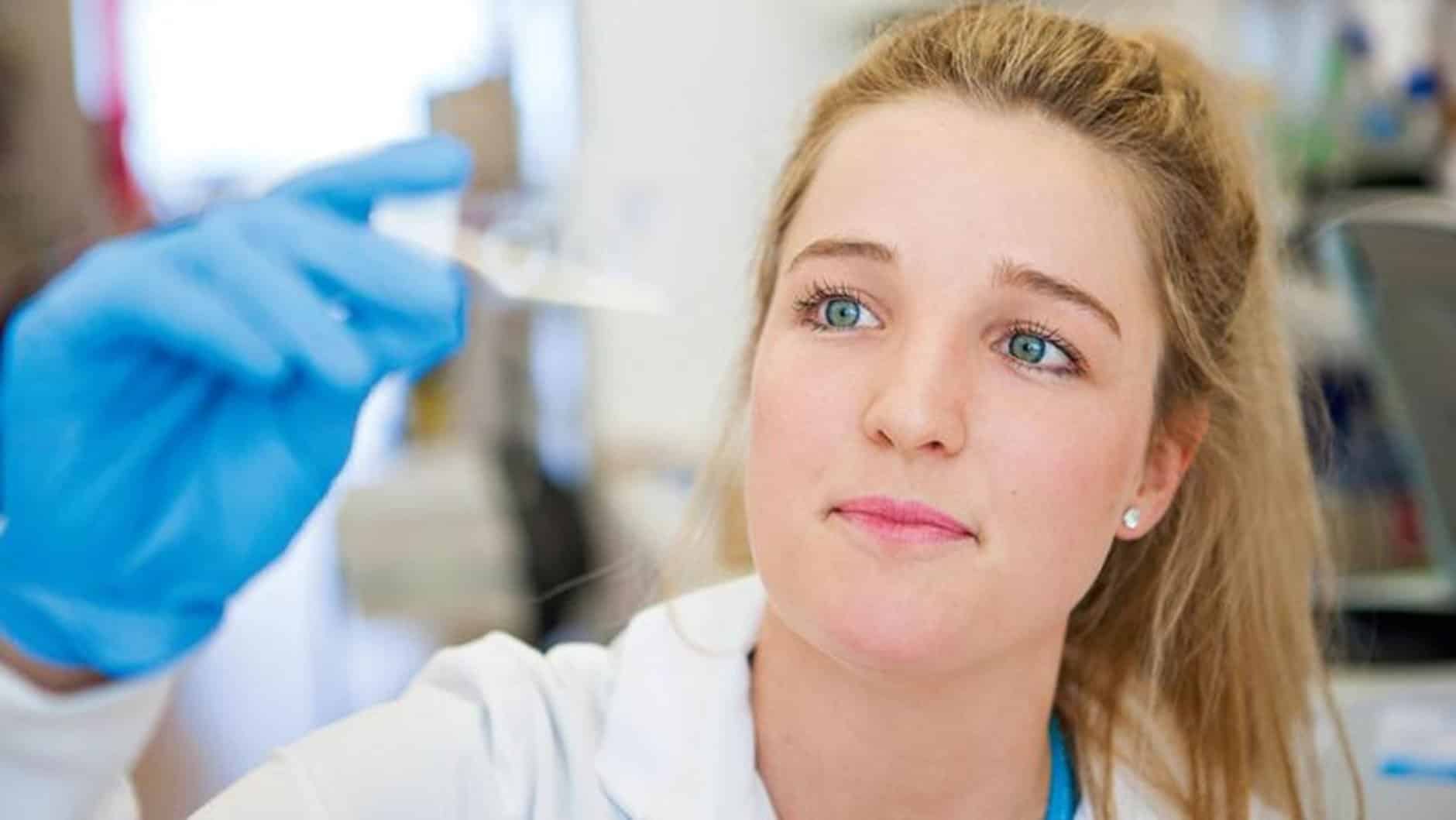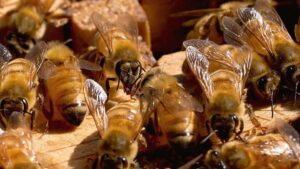
Originally published in The West Australian: 17 November 2020
Ciara Duffy falls to silence when she considers the possibilities that lie ahead. Her research that honeybee venom can kill aggressive breast cancer cells has been hailed as “incredibly exciting” and attracted worldwide attention. Years of work stretch into the future, but if she gets funding and can continue her studies, perform human trials and they prove successful; it is humbling, and quietly thrilling, to think what this would mean for the great gathering of women, and men, who are diagnosed with breast cancer each year.

Bees have lead to a breast cancer breakthrough. Image credit: Harry Perkins Institute
Duffy, who completed her PhD last year at the University of WA and the Harry Perkins Institute of Medical Research, is driven by seeing a close friend battle the ravages of breast cancer and remembers bursting into tears when research results showed that the cancer cells died when exposed to the venom. “My goal is to have an impact for cancer patients,” she says simply. “This is my baby and I will always be excited by it.”
The results were significant because the honeybee venom proved particularly potent against triple-negative breast cancer, which attacks younger women, is extremely aggressive and has no clinically effective targeted drug treatment. About 15 per cent of all breast cancers are triple negative, and breast cancer remains the most common cancer in women in Australia. Improved treatments and earlier detection mean the five-year survival rate is about 90 per cent.
As a child Duffy was intensely interested in human anatomy and everything science related. “The fascination was all mine,” she says. “I think I have always had a science mind. I was like, ‘How do these cells work, how do they form all these layers and wrap around each other and form the human body?’ It is so incredible.” She went first to Orana Catholic Primary School in Willetton and then to Santa Maria College. She had wanted to do medicine at university but didn’t get in, so switched her studies to a biomedical science double major.
Her life would change dramatically at the end of her first year at university when a close friend became ill with breast cancer. She would see close-up the effects of the treatment — surgery, radiation, chemotherapy — and also learn there was no targeted drug treatment for the triple negative cancer. “It turned my world upside down and I was just so angry,” she says. “I knew nothing about cancer until this happened and I was like, ‘Why isn’t there treatment for this type. What can we do about it’.” She would also learn a life-long lesson about the power of supporting and caring for someone.
Duffy’s friend recovered but the experience sharpened her focus and she switched her studies to anatomy and physiology. In her third year she would meet Associate Professor Pilar Blancafort, whose work in cancer epigenetics Duffy found inspiring and who would go on to be her primary PhD supervisor. She would also meet her other supervisors, Professor Boris Baer and Professor Killugudi Swaminatha Iyer, and a wonderful collaboration began. “Boris had watched a talk by a veterinarian from Chile who was working with dogs that had cancer,” Duffy says. “She was taking these honeybees and stinging directly into these cancer tumours and they were shrinking and going away. Everybody said how does that work, so they decided to create a project and said to me, right, you are going to be looking at the effects of honeybee venom on breast cancer.” Duffy laughs at the thought of working with bees. “I was like, bees? I’m allergic to bees. I’m actually not but I thought I was.” She would do a Google search and find that many drugs are based on natural products. “I thought, you never know what could work so let’s give this a try,” she says.
She joined the team in Christmas 2014 as part of her year-long Honours studies and then pushed on into her PhD for another three years and nine months. It was time of remarkable discoveries. Duffy remembers going out to a hive one day in her Honours year, collecting venom from the bees and spending hours in a laboratory. “I remember riding in the rain from UWA all the way up to the institute with the venom on ice in a little Esky,” she says. “I diluted it, put it on the cells and the next day the results showed that the cancer cells had completely died. I burst into tears. It was so exciting. I was the first person in the world to ever see this result. It was the beginning of a wonderful journey.”
That journey would take her to Dublin and London, where she collected honeybee venom and imported it using a special permit to test whether the venom was equally effective in different honeybee populations. She also collected venom from bumblebees. “I found that the European honeybee in Australia, Ireland and England produced almost identical effects in breast cancer compared to normal cells,” she says. However, the bumblebee venom didn’t kill the cells, even at very high concentrations. Duffy would also test a small compound found in honeybee venom called melittin, which can be manufactured synthetically, and found the synthetic product had the same potent anti-cancer effects as the venom.
Her tests also focused on different types of breast cancer. Humans have been using bee products medicinally for thousands of years and scientists have previously shown that bee venom can be used on cancer cells, “but no one had previously assessed whether it could be used to specifically affect breast cancer cells compared to normal cells and really dug into the mechanism of action and how this actually works”, she says. Duffy tested about 11 different cell lines, with the research showing aggressive triple-negative and HER2-enriched breast cancer cells were the most affected by the venom. Results in the other cells were also significant.
Duffy is now working in London as a medical writer for a pharmaceutical group, dealing with all the international attention and waiting to take the next steps. She says she had no idea her research would cause such a storm. “It has been wonderful,” she says. “I had no idea it would blow up this much.” BBC News called and wanted an interview but Duffy initially declined because everything was getting “too big”. “I was told later that it would be wiser to accept,” she says. After publishing her research in the prestigious international journal Nature Precision Oncology, she needed a patent to protect some of the work and her team are now looking at partnerships and funding to push the research forward. “We need to do more experiments,” she says, “and hopefully the bigger players will come in when we do toxicity studies and studies on larger animals.”
Future research will look at how patients may be affected, how to better target and deliver the treatment and whether it could also be used in conjunction with chemotherapy.
